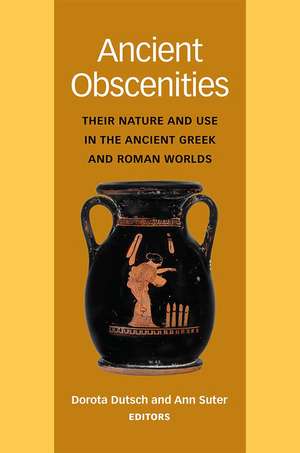Ancient Obscenities: Their Nature and Use in the Ancient Greek and Roman Worlds
Autor Dorota Dutsch, Ann Suteren Limba Engleză Hardback – 17 noi 2015
Ancient Obscenities inquires into the Greco-Roman handling of explicit representations of the body in its excretory and sexual functions, taking as its point of departure the modern preoccupation with the obscene. The essays in this volume offer new interpretations of materials that have been perceived by generations of modern readers as “obscene”: the explicit sexual references of Greek iambic poetry and Juvenal’s satires, Aristophanic aischrologia, Priapic poetics, and the scatology of Pompeian graffiti. Other essays venture in an even more provocative fashion into texts that are not immediately associated with the obscene: the Orphic Hymn to Demeter, Herodotus, the supposedly prim scripts of Plautus and the Attic orators. The volume focuses on texts but also includes a chapter devoted to visual representation, and many essays combine evidence from texts and material culture. Of all these texts, artifacts, and practices we ask the same questions: What kinds of cultural and emotional work do sexual and scatological references perform? Can we find a blueprintfor the ancient usage of this material?
Preț: 567.04 lei
Preț vechi: 736.42 lei
-23% Nou
Puncte Express: 851
Preț estimativ în valută:
108.51€ • 116.03$ • 90.47£
108.51€ • 116.03$ • 90.47£
Carte indisponibilă temporar
Doresc să fiu notificat când acest titlu va fi disponibil:
Se trimite...
Preluare comenzi: 021 569.72.76
Specificații
ISBN-13: 9780472119646
ISBN-10: 0472119648
Pagini: 366
Ilustrații: 14 illustrations, 1 table
Dimensiuni: 152 x 229 x 38 mm
Greutate: 0.64 kg
Editura: UNIVERSITY OF MICHIGAN PRESS
Colecția University of Michigan Press
ISBN-10: 0472119648
Pagini: 366
Ilustrații: 14 illustrations, 1 table
Dimensiuni: 152 x 229 x 38 mm
Greutate: 0.64 kg
Editura: UNIVERSITY OF MICHIGAN PRESS
Colecția University of Michigan Press
Notă biografică
Dorota Dutsch is Associate Professor of Classics at the University of California, Santa Barbara.
Ann Suter is Professor Emerita of Classical Studies at the University of Rhode Island.
Descriere
References to the body’s sexual and excretory functions occupy a peculiarly ambivalent space in Greece and Rome
